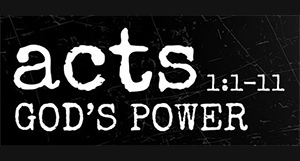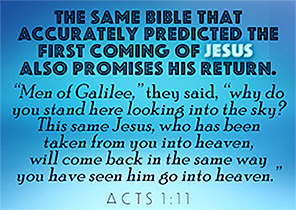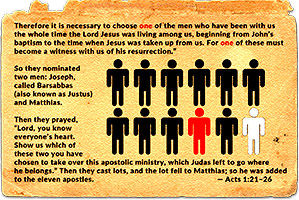
Acts 1:1–26 . . .
“Prelude to Pentecost”
Jesus prophesied that he’d build his church and that the gates of hell wouldn’t prevail against it (Matthew 16:18). The book of Acts tells us how his church began in Jerusalem and spread to the ends of the earth. It provides a vital link between the gospels and the New Testament epistles.
How did the Christian faith that began with a few followers of Jesus in Israel spread to Rome and points beyond? How did an ardent Jew who wasn’t even a believer become the apostle to the Gentiles? How did the early church, which was exclusively Jewish, begin to reach out to and incorporate the non-Jews? Without Acts, we’d be hard pressed to answer those questions. While we have four gospel accounts of the life of Jesus Christ, there’s only one book of Acts.
[Note: Find and read today’s Scripture near the bottom of this page.]
Almost all Bible scholars agree that Luke was the author of Acts. He was a physician (Colossians 4:14), and the only Gentile author of the Bible. An early writing, dated between AD 160–180, tells us that Luke was a Syrian from Antioch, a single man who accompanied Paul until his martyrdom, and who died himself at age 84 (cited by Simon Kistemaker, Acts [Baker], p. 20). Luke probably wrote Acts around AD 62–64, toward the end of Paul’s first imprisonment in Rome, where the book leaves off. Because there’s no mention in Acts of the intense persecution launched by Nero in AD 64, or of the martyrdom of Paul in about 68, Acts was probably written before those events.
The first verse of Acts links it with the introduction of Luke’s gospel (Luke 1:1–4). Both volumes were written to an otherwise unknown man, Theophilus, probably a Roman official, to provide an accurate historical foundation for his faith in Jesus Christ. Together, Luke and Acts comprise about 30 percent of the New Testament, surpassing both the writings of Paul and John in word count.
Chapter 1’s vv. 1–11 describe what happened during that 40-day period between our Lord’s resurrection and his ascension (shown here). In vv. 12–14, Luke tells us what the apostles were doing while they waited. Finally, vv. 15–26 are the account of the selection of Matthias as the twelfth apostle, a replacement for Judas.
Note: The introduction of Luke’s Acts volume recounts how the risen Jesus spent some 40 days with his disciples, teaching them about “the Kingdom of God” (Acts 1:3), connecting back to the story of Luke’s gospel.
Jesus Commissions His Disciples and Ascends to Heaven (ch. 1)
› Watch BibleProject’s superb animated video (1.5 min.) that highlights Luke’s account of the growing multi-ethnic Church.
From Christ’s Resurrection to His Return: Forty Days of Purpose (1:1–11)
Luke begins the book of Acts by informing his readers that it’s the second volume of his account of the life and ministry of Jesus. Volume 1 — the Gospel of Luke — is the description of “all that Jesus began to do and teach until the day he was taken up to heaven, after he had given orders by the Holy Spirit to the apostles he had chosen” (v. 1b–2a). By inference, this second volume is the account of all that Jesus continued to do and to teach, through his apostles. As the first volume ends with the Great Commission, the second volume begins with it (v. 8, see bookmark). The role of the Holy Spirit in our Lord’s giving of the Great Commission is essential. We read in v. 2 that Jesus gave orders by the Holy Spirit, and that the Great Commission was an order given to the apostles who Jesus himself had chosen. The same Holy Spirit who empowered Jesus as he gave the Great Commission is the One who’ll empower his hearty disciples today to carry out this command.
Remember from our Luke study that Jesus waited 40 days from the time of his resurrection till the day of his ascension into heaven. During those 40 days, he provided “many convincing proofs” that he’d indeed risen from the dead. During this 40-day period, our Lord spoke with the apostles concerning things pertaining to the kingdom of God (v. 3). We’re not, however, given any indication as to what they were. The “Kingdom of God” discussions likely centered on: (1) the Great Commission (the kingdom’s expansion); (2) the promise of the Holy Spirit (the power source); and (3) restoration and leadership.
There’s additional evidence that our Lord spoke to the apostles about the mystery of the church during these 40 days. When the apostles asked Jesus about the timing of the coming of God’s kingdom, they seem to indicate that they know that the kingdom will be set aside for a time (v. 6). Yet there’s a theme that dominates the 40-day period between the Lord’s resurrection and ascension. Perhaps it might go like this: Your mission until I return is to preach the gospel to all nations. The Holy Spirit will come upon you shortly to empower you to carry out this task, … so wait in Jerusalem until you receive this power. When the apostles pressed Jesus to tell them when the kingdom of God would be established, Jesus graciously refused, informing them that that information was outside their authority — there was no “need to know” as far as they were concerned.
While Luke’s account of our Lord’s ascension is brief it’s informative (vv. 9–11). Luke’s “Great Commission” account (unlike those in the gospels of Matthew, Mark, and John) was given just prior to his ascension. Jesus’ last words on earth sum up the focus of the first eleven verses of Acts. In effect: They are to be his witnesses, beginning in Jerusalem and ending in the remotest part(s) of the earth.
Forty days after Jesus’ resurrection, the Lord ascended back to the Father from the Mount of Olives. Imagine his disciples’ emotions as he disappeared from their sight. But then two angels suddenly announced, “‘Men of Galilee,’ they said, ‘why do you stand here looking into the sky? This same Jesus… will come back in the same way you have seen him go into heaven’” (v. 11). Both angels gave the multitude a gentle rebuke, if a rebuke at all (as depicted in the video that’s linked beneath my summary). For what were they standing there, looking into the sky? Jesus would come back, just as they saw him depart. The inference is: Don’t just stand here; get going and take action to tell others the good news about Lord Jesus!
What to Do While Waiting Patiently in Jerusalem (vv. 12–14)
It’s clear in the next three verses that the apostles were men of obedience and prayer. Verses 12–14 give us only a general description of the activities of the apostles (and the broader group of disciples) during that ten-day “waiting period” of united prayer, between the Ascension of Jesus and the Day of Pentecost, which is a critical narrative bridge. As commanded, they went back to Jerusalem, taking “a Sabbath day’s walk” (v. 12), which was the maximum distance that Jews permitted themselves to walk on an otherwise restful Sabbath; Jews couldn’t walk any farther than 2,000 cubits, which is about a kilometer or two thirds of a mile.
The disciples went up to the “upper room,” where the Eleven (v. 13), along with the women who’d followed Jesus (cf. Luke 8:1–3; 23:49; 24:1–10), Mary (the mother of our Lord), and his brothers (v. 14) waited. The brothers, who hadn’t previously believed in Jesus had now come to faith, no doubt largely due to his resurrection. We see in v. 13a that their upper room may have been a place well known to the apostles, perhaps a room owned by someone close to Jesus. It’s also possible that this was the room or safe-house where the apostles had been staying the previous 40 days.
Luke shows [in both of his volumes] that women were important to him (v. 14). The women who’d waited in the upper room had traveled to Jerusalem from Galilee with Jesus and his disciples (Luke 8:2–3). Mary, Jesus’ mother, was also there. All of the loyal followers of Jesus, men and women who waited in the upper room, demonstrated their individual and collective faith. While it’s not plainly stated, it would seem that from a human point of view the soon-to-occur events at Pentecost were partially a response to the prayers of these saints.
In vv. 12–14 is a description of what the Eleven did from the time of our Lord’s death till Pentecost. While staying in Jerusalem, as Jesus had instructed them, they devoted themselves to prayer. We’re not told for what they had prayed. Perhaps they prayed for the coming of God’s kingdom; more likely they prayed for the coming of the promised Holy Spirit.
Finding Judas’ Replacement (vv. 15–26)
During the disciples’ ten-day period of united prayer, a replacement was to be chosen for Judas. Luke put much effort (and space) in describing an event that appears to have had little impact on the events following Pentecost. Verses 15–26 immediately precede Pentecost but don’t appear to have a profound impact on the apostles or the community of believers. We should, therefore, closely observe what happened, as follows…
Verse 24 starts with “Then they prayed.” Verse 26 continues: “Then they cast lots, and the lot fell to Matthias.” Sadly, nowhere else in the Bible is Matthias mentioned. Eusebius, a history writer who lived from about AD 260 to 340, said that the 70 disciples in Luke 10:1 included Matthias and Barsabbas, however, Luke doesn’t write about either man again. And regarding “casting lots,” that was the usual way the Jews made selections. Lots were cast many times in the Old Testament by writing people’s names on stones [shown in photo to the right], putting the stones in a jar, then shaking the jar until a stone fell out; the name on the stone would be the chosen person. This was the last time lots that were cast in the New Testament. After the Holy Spirit would come, the disciples would no longer need to take that step; instead, the Holy Spirit would guide them. So, here the disciples prayed collectively, asking God to choose between Matthias and Barsabbas: the lot fell to Matthias.
We know that unified prayer preceded this process (v. 14); indeed prayer was a part of the process (v. 24–25). We learned that it was Peter who provided the leadership (v. 15). The search for Judas’ replacement was prompted, at least in part, by the consideration (v. 20) of some Old Testament Scriptures (Psalm 69:22–25; 109:6–8): From Psalm 69, they recognized that Judas’ betrayal was part of the divine plan; it was no accident; it didn’t catch God off guard. In particular, Judas’ death was seen to be a part of that divine plan: The events surrounding Judas’ death were interpreted as the fulfillment of Psalm 69:25’s prophecy; the decision to proceed with the process of replacing Judas was seen as obedience to Psalm 109:8, thus leading to its fulfillment.
Remember that the apostles weren’t religious geniuses who invented Christianity; they weren’t profound philosophers or even theologians. They were witnesses. Good witnesses don’t invent stories; they truthfully tell exactly what they’ve seen and heard. Thus Peter, in setting forth the qualifications for Judas’ replacement, stated that the man must have been with Jesus from the beginning of Jesus’ ministry and must have witnessed his resurrection (vv. 21–22).
It’s important to affirm that the Christian faith is founded primarily on one historical event that has many credible eyewitnesses: Jesus Christ’s resurrection from the dead. It was to this historic, life-changing event — the resurrection of Jesus Christ from the dead — that the apostles spent the rest of their lives proclaiming that it was true. Each of us must consider our personal witness of Christ’s resurrection from the dead, and either accept or reject it.
Let’s pray collectively a unified prayer, much the same as Jesus’ disciples prayed continually in their upper room: May God grant that our hearty study of this great book of Acts prove to be a life-changing one, and that each of us may, in the power of his Spirit, be his instruments for the carrying out of the Great Commission in our day. Amen.
† Summary of Acts 1:1–26
Chapter 1 of this volume records Luke’s introduction to Acts, Jesus’ final instructions and ascension, the disciples’ prayerful waiting in Jerusalem, and the selection of Matthias to replace Judas. This passage bridges the ministry of Jesus in Luke’s Gospel with the Spirit‑empowered mission of the church in Acts.
Key points with verse references:
• Luke addresses Theophilus and connects this book with his earlier gospel, summarizing what Jesus “began to do and teach” until his ascension (Acts 1:1–2).
• The risen Christ appears for forty days, giving many proofs of his resurrection and teaching about the kingdom of God (v. 3).
• Jesus commands the disciples to stay in Jerusalem and wait for the promised Holy Spirit, who’ll empower them to be his witnesses from Jerusalem to the ends of the earth (vv. 4–8).
• Jesus ascends to heaven, and two angels promise he’ll return in the same way (vv. 9–11).
• The apostles return to Jerusalem, devote themselves to prayer with other believers, and under Peter’s leadership choose Matthias to replace Judas, restoring the number of apostles to twelve (vv. 12–26).
- Q. 1 Why is the resurrection of Jesus central to the Christian faith?
- Q. 2 How does the Holy Spirit help you to know God’s will? Is it wrong to cast lots (flip a coin)? Support your answer with Scripture.
Acts 1:1–26
New International Version (NIV)
[View it in a different version by clicking here; also listen to this chapter.]
† Watch this video clip of Acts 1:1–2:14, starring Bruce Marchiano as Jesus, James Brolin as Simon Peter, Harry O. Arnold as Saul/Paul, and Dean Jones as Luke.
Jesus Taken Up Into Heaven
1 In my former book, Theophilus, I wrote about all that Jesus began to do and to teach 2until the day he was taken up to heaven, after giving instructions through the Holy Spirit to the apostles he had chosen. 3After his suffering, he presented himself to them and gave many convincing proofs that he was alive. He appeared to them over a period of forty days and spoke about the kingdom of God. 4On one occasion, while he was eating with them, he gave them this command: “Do not leave Jerusalem, but wait for the gift my Father promised, which you have heard me speak about. 5 For John baptized with water, but in a few days you will be baptized with the Holy Spirit.”
6Then they gathered around him and asked him, “Lord, are you at this time going to restore the kingdom to Israel?”
7He said to them: “It is not for you to know the times or dates the Father has set by his own authority. 8But you will receive power when the Holy Spirit comes on you; and you will be my witnesses in Jerusalem, and in all Judea and Samaria, and to the ends of the earth.”
9After he said this, he was taken up before their very eyes, and a cloud hid him from their sight.
10They were looking intently up into the sky as he was going, when suddenly two men dressed in white stood beside them. 11“Men of Galilee,” they said, “why do you stand here looking into the sky? This same Jesus, who has been taken from you into heaven, will come back in the same way you have seen him go into heaven.”
Matthias Chosen to Replace Judas
12Then the apostles returned to Jerusalem from the hill called the Mount of Olives, a Sabbath day’s walk from the city. 13When they arrived, they went upstairs to the room where they were staying. Those present were Peter, John, James and Andrew; Philip and Thomas, Bartholomew and Matthew; James son of Alphaeus and Simon the Zealot, and Judas son of James. 14They all joined together constantly in prayer, along with the women and Mary the mother of Jesus, and with his brothers.
15In those days Peter stood up among the believers (a group numbering about a hundred and twenty) 16and said, “Brothers and sisters, the Scripture had to be fulfilled in which the Holy Spirit spoke long ago through David concerning Judas, who served as guide for those who arrested Jesus. 17He was one of our number and shared in our ministry.”
18(With the payment he received for his wickedness, Judas bought a field; there he fell headlong, his body burst open and all his intestines spilled out. 19Everyone in Jerusalem heard about this, so they called that field in their language FrameMaker, that is, Field of Blood.)
20“For,” said Peter, “it is written in the Book of Psalms:
“‘May his place be deserted;
let there be no one to dwell in it,’ and,
“‘May another take his place of leadership.’
21Therefore it is necessary to choose one of the men who have been with us the whole time the Lord Jesus was living among us, 22beginning from John’s baptism to the time when Jesus was taken up from us. For one of these must become a witness with us of his resurrection.”
23So they nominated two men: Joseph called Barsabbas (also known as Justus) and Matthias. 24Then they prayed, “Lord, you know everyone’s heart. Show us which of these two you have chosen 25to take over this apostolic ministry, which Judas left to go where he belongs.” 26Then they cast lots, and the lot fell to Matthias; so he was added to the eleven apostles.







